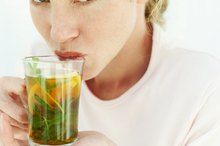What does fact checked mean?
At Healthfully, we strive to deliver objective content that is accurate and up-to-date. Our team periodically reviews articles in order to ensure content quality. The sources cited below consist of evidence from peer-reviewed journals, prominent medical organizations, academic associations, and government data.
- MayoClinic.com; Caffeine: Is It Dehydrating or Not?; K. Zeratsky, R.D., L.D.; August 2009
- MayoClinic.com: Dehydration
The information contained on this site is for informational purposes only, and should not be used as a substitute for the advice of a professional health care provider. Please check with the appropriate physician regarding health questions and concerns. Although we strive to deliver accurate and up-to-date information, no guarantee to that effect is made.
Hydrochlorothiazide & Caffeine Interaction
Hydrochlorothiazide is a prescription diuretic to treat high blood pressure or water retention associated with heart disease and other conditions. Caffeine is the most commonly used stimulant in the modern world and also promotes diuresis or water loss. Avoid consuming caffeine in excess when taking HCTZ or other diuretics to avoid becoming dehydrated.
Hydrochlorothiazide
HCTZ reduces the ability of the kidneys to retain sodium in the body, causing sodium and water to be removed in the urine. This reduces the blood volume and thus lowers blood pressure and reduces and fluid retention in body tissues. Your doctor may prescribe HCTZ to reduce blood pressure or control edema, or water retention, associated with heart failure or another medical condition. Follow all instructions of your doctor and pharmacist when taking HCTZ.
- HCTZ reduces the ability of the kidneys to retain sodium in the body, causing sodium and water to be removed in the urine.
- Your doctor may prescribe HCTZ to reduce blood pressure or control edema, or water retention, associated with heart failure or another medical condition.
Caffeine
Diuretic Effects of Caffeine
Learn More
Caffeine has broad effects on the body ranging from the promotion of energy and focus to diuresis and vasoconstriction, or tightening of blood vessels. According to MayoClinic.com, 500 to 600 mg of caffeine, equal to about four to seven cups of coffee, has a strong diuretic effect on the body 2. Lower amounts may not have as strong of a diuretic effect. Drinking coffee, sodas or other strongly caffeinated drinks in excess should be avoided while taking HCTZ in order to avoid dehydration. Drink water or tea instead.
- Caffeine has broad effects on the body ranging from the promotion of energy and focus to diuresis and vasoconstriction, or tightening of blood vessels.
- Drinking coffee, sodas or other strongly caffeinated drinks in excess should be avoided while taking HCTZ in order to avoid dehydration.
Dangers of Dehydration
The health effects of dehydration go beyond headaches and muscle cramps. Untreated, severe dehydration can lead to heart injury, cerebral edema or swelling of the brain, seizure, hypovolemic shock, kidney failure, coma, and death. Mild dehydration is seen as a dry or sticky mouth, thirst, fatigue, headaches and cramping and can be treated by increasing your fluid intake. Seek immediate medical help if you notice extreme thirst, little or no sweating or urination, very dry mouth and skin, low blood pressure, rapid heartbeat, or fever.
- The health effects of dehydration go beyond headaches and muscle cramps.
- Seek immediate medical help if you notice extreme thirst, little or no sweating or urination, very dry mouth and skin, low blood pressure, rapid heartbeat, or fever.
Avoiding Dehydration
Can Drinking Tea Dehydrate You?
Learn More
The best way to treat dehydration while on a diuretic such as HCTZ is to avoid excess consumption of other diuretics such as caffeine and to maintain consistent fluid intake. Eat a diet low in salt and high in fruits and vegetables that are rich in water as well as nutrients. Fluid intake should consist mainly of water or tea. Sugary drinks and drink mixes should be avoided.
- The best way to treat dehydration while on a diuretic such as HCTZ is to avoid excess consumption of other diuretics such as caffeine and to maintain consistent fluid intake.
Related Articles
References
Writer Bio
Chris Daniels covers advances in nutrition and fitness online. Daniels has numerous certifications and degrees covering human health, nutritional requirements and sports performance. An avid cyclist, weightlifter and swimmer, Daniels has experienced the journey of fitness in the role of both an athlete and coach.









